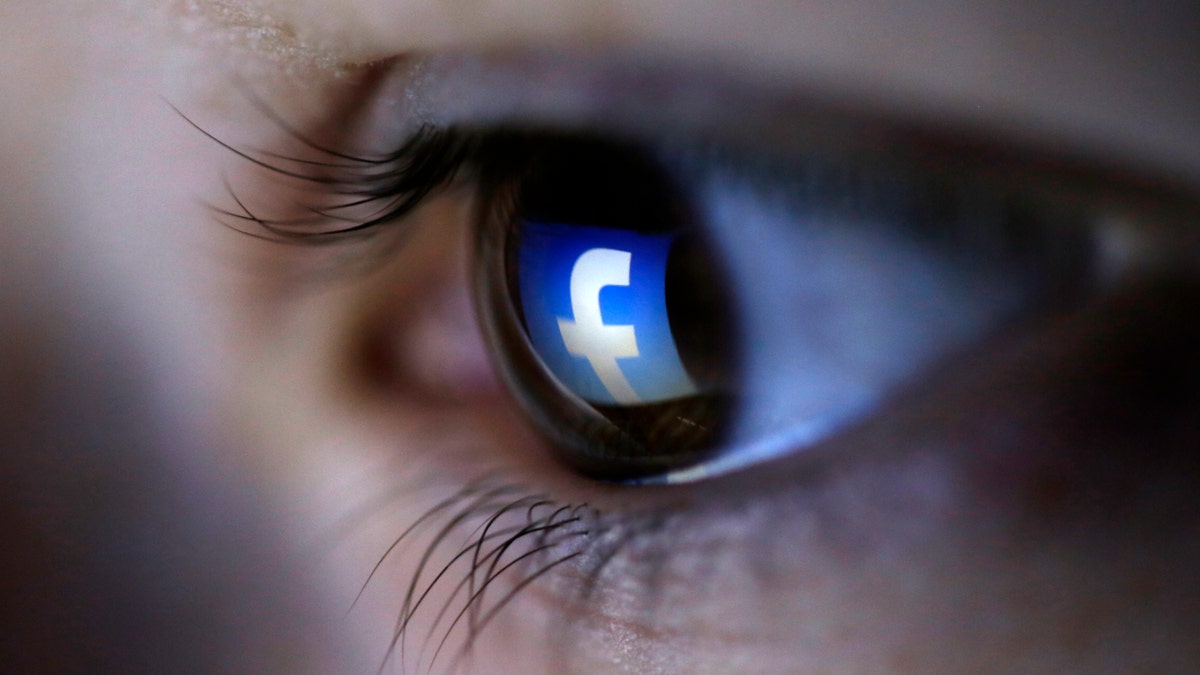
A picture illustration shows a Facebook logo reflected in a person's eye, in Zenica, March 13, 2015. (REUTERS/Dado Ruvic)
First the good news. The European Commission and EU member states together with Facebook, Twitter, Google/YouTube and Microsoft unveiled a code of conduct this week that includes a series of commitments to combat the spread of illegal hate speech online in Europe.
This is a welcome, if not long overdue development. The Charlie Hebdo assassinations and continuing spate of terrorist mass murders in France and Belgium may have outraged the civilized world, but terror groups use Twitter and other Social Media to portray the Islamist killers as heroes to young Muslims in Europe and beyond. It is estimated that last fall ISIS was sending out 200,000 tweets a day!
Yet, beyond terrorism is the distressing mainstreaming of hate and anti-Semitism in Europe.
It was through social media postings in the UK, that the shocking widespread anti-Jewish animus of officials of Britain’s Labour Party was first exposed.
It was social media platforms that helped the Pegida movement and other anti-immigrant parties to make serious inroads among German voters.
Pegida’s founder, Lutz Backman, initially used Facebook to virally generate support from tens of thousands of citizens worried that their society could not handle the wave of largely Muslim immigrants.
Backman used his Facebook rants to label refugees “animals” and “scumbags”, posted a picture of himself with Hitler-style hair and moustache, and later posted a picture of a man wearing the KKK uniform and the slogan: "Three Ks a day keeps the minorities away."
Facebook eventually took measures to stop Pegida from using their service to spread their gospel of fear and Backman resigned, but the fear and resentment among alarmed Germans has only increased.
So a united front by Europe and social media elites against online hate is definitely a good thing.
However, this week’s announcement does not address the burgeoning online hate in the US. Hate speech in our country is not illegal but it is no less toxic.
Hate is hate. Why don’t the global social media giants apply the same standard against bigotry, wherever and whatever the source?
It appears from this week’s announcement in Brussels that hate postings, for example about the “Big Lie” of the blood libel (that Jews use the blood of Christian children for ritual purposes), would be removed in Germany within 24 hours, but would remain untouched if posted through a U.S. page.
Why? If the companies set their own terms of use, why not voluntarily expand it to take into account the red flag of hate emanating from sister democracies?
There are other areas that demand immediate action: Twitter needs to work to shut down vicious hate hashtags.
Here is a sample of just some of the active hate hashtags on Twitter:
#makeamericawhiteagain
#mexicanscum
#sendthemback
#deportmuslimsnow
#f*ckjews
#f*ckhispanics
#raghead
#f*ckblacks
#porchmonkey
#jewbag
#islamistheproblem
#theslaughterofthejews (Arabic)
#theCaliphatestate (Arabic)
Our previous complaints to Twitter about these billboards of hate have not yielded any positive results.
Which brings us to a critical issue for all social media platforms -- starting with Twitter.
America is embroiled in a historically toxic presidential campaign season, with bombast and invective overwhelming civil debate.
Recently, two members of the media, Jonathan Weisman from the New York Times, and Ben Shapiro, a conservative commentator based in Los Angeles, experienced a tsunami of anti-Semitic tweets after they had criticized presidential candidate, Donald Trump.
Perhaps it is time for the social media giants to publish their own code of online conduct for this presidential campaign season, one which would be applied across the board from the progressives on the left to Tea Party members on the right.
We say yes to debates. No to hate.
Before the Internet revolution, such hateful and harmful expressions were usually found scrawled on bathroom walls, not presented with our morning coffee.
Americans don’t want or need the government telling us what’s right or wrong. We already know. It’s time for Twitter and other social media giants to lead the way in removing hate from America’s virtual town square.
Richard Eaton is a Senior Researcher at the Simon Wiesenthal Center is a leading expert on online extremism.
